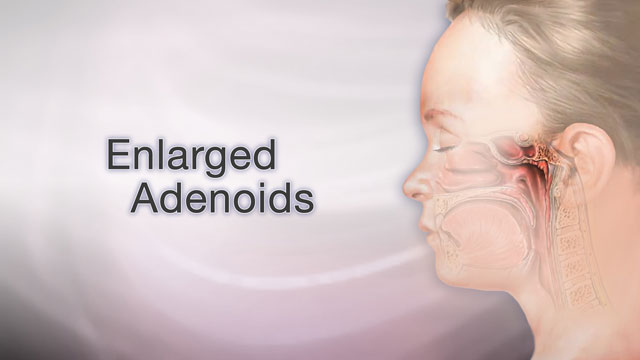Enlarged adenoids

- Subtitles
- Off
- Captions
- Off
- Chapters
Enlarged adenoids
Maybe your child snores a lot. Maybe your child gets a lot of ear infections or has a lot of sore throats. There's a good chance your child has a problem with his adenoids. Let's talk about enlarged adenoids.
The adenoids are glands located between the airway your child breathes into through their nose and the back of your child's throat. Like your child's tonsils, the adenoids can often become swollen. This may happen if the adenoids grow too large, instead of shrinking as your child gets older. If the adenoids continue to grow, your child may have bad breath, cracked lips, and a dry mouth. Your child might breathe a lot through his mouth. That's because his airway can become blocked, and he may have trouble breathing through his nose. Your child may even stop breathing at times during sleep.
Your child's doctor will use a special mirror to see if the adenoids are swollen. Your child may also need an x-ray.
Your child's doctor may try to treat the chronic swelling with medications such as antibiotics. If that doesn't work, your child may need surgery to remove the adenoids.
If your child needs surgery, he will be given general anesthesia and be asleep and unable to feel pain. The surgeon will prop your child's mouth open with a small instrument, then remove the adenoid glands, while probably removing the tonsils at the same time. Your child will probably go home the same day as surgery.
Surgery to remove the adenoids, called an adenoidectomy, is one of the most common reasons children have surgery. But surgery doesn't have to be all bad. Your child can look forward to a steady diet of pudding, ice cream, and other soft and fun foods, until they feel better. And hopefully your child can look forward to fewer sore throats and ear infections, and more normal breathing, in the future.
